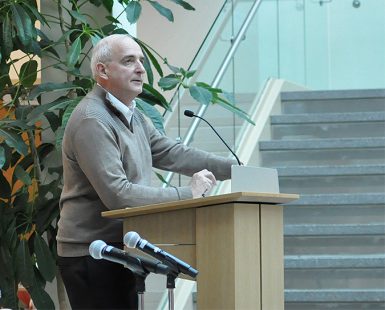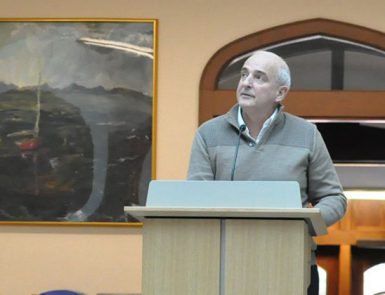Cohen describes migration crises, causes

By Connor Cronin and Emma Pappas
Xenophobia, or anxiety over the strange or foreign, exists because of fear, and that’s what drives the treatment of immigrants and asylum seekers around the world.
And countering that is important to keep America creative and vibrant, said Roger Cohen, New York Times columnist, in his talk Monday afternoon in the Franklin Hall commons.
Cohen, in his role as chair of the IU Poynter Center for the Study of Ethics and American Institutions, discussed the global immigration crisis of refugees and asylum seekers in his talk, “Migration in All Its Forms.”
As an example, he drew on his reporting trip to island detention centers, where the Australian government has held asylum seekers and hopeful immigrants for several years in what many have termed inhumane conditions.
“All of these people were entitled to a process, and there was no process, which is where the problem lies. These people were just dumped…and were left in complete limbo,” he told his audience Monday afternoon in the Franklin Hall commons.
Cohen expanded on his December New York Times story, “Broken Men in Paradise,” and spoke about the cruelty that these people endured. This issue has become a major global problem with more than 65 million people seeking refuge.

Cohen pointed to political leaders like President Donald Trump as a source of the problem, as they have presented refugees as an undifferentiated mass of people.
“America is about creative churn, and if you take away openness to refugees and to asylum seekers, you kill the American idea,” Cohen said.
The columnist told his audience that journalism has never been more important to ensure that these people are treated with fairness and equality.
Before the talk, Media School students showed data visualizations of refugee flow into the Australian island detention centers. The students from professor of practice Elaine Monaghan’s Public Relations Writing class created the materials to illustrate Cohen’s talk.
“It was great to work in a team with the goal of creating a graphic meant to be viewed and understood by an audience that is unfamiliar with the data,” said Brian Brussee, one of the students in the class.
The project displayed the origins of the refugees imprisoned on Manus Island and Nauru, as well as showed the number of refugees who have stayed on the islands in comparison with those who have been relocated.
As he ended his part of the talk, Cohen reminded the audience these refugees are human beings who are not fleeing their homes by choice, but rather because of unrest in their home countries.
After the talk, School of Global and International Studies professor Elizabeth Dunn and local editor and writer Elisabeth Andrews joined the panel to further the discussion of the current crisis. The next steps should not be to shut out those seeking refuge, the panelists said, but rather to welcome them safely.
The panel urged audience members to resist the fear of xenophobia.
“Who can we blame? Fear,” said Cohen. “It’s in our genes, ‘watch out if you want to survive.’ It is a very, very strong and irresistible force.”
More:

